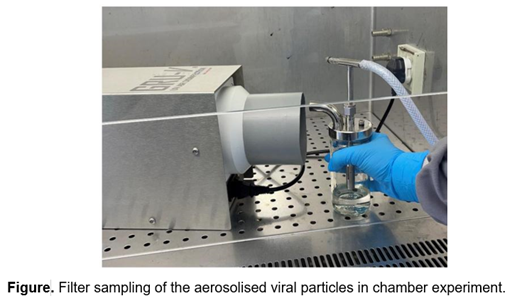Dr Andrew Wright
SaFEGround will investigate how heat pumps can be coupled with underground civil engineering structures (foundations, piles etc.) to deliver low-carbon heating and cooling

Funded by:

Showcasing our research for the Queens 30th
Dr Andrew Wright
SaFEGround will investigate how heat pumps can be coupled with underground civil engineering structures (foundations, piles etc.) to deliver low-carbon heating and cooling

Funded by:

Grant awarded: £24,988.75
PI: Ahbishek Tiwary
Funder: UKRI
This is a proof-of-concept study towards developing a methodological capacity to assess the efficacy of an innovative air treatment unit (henceforth the EnHANCE system) in enclosed spaces. It is motivated by its potential deployment in public transport microenvironments such as lounge, lifts and stairways to simultaneously control pathogens and improve the air quality. The first part of the project mainly focused on developing a measurement protocol for the EnHANCE system (and systems like it). It involved performance testing of the system through an inlet-outlet monitoring scheme in controlled lab environment under three different ventilation scenarios (closed room, closed room with in-flow through a vent, open room with a cross-flow); two identical portable equipment were used for monitoring air pollutants – particulate matter (PM10 and PM2.5), total volatile organic carbon (TVOC, including benzene, toluene) and the microenvironment (temperature and humidity).
In the next step, the performance of the system for reduction in virus loading was evaluated in a controlled virology lab. Human coronavirus (HCoV)-OC43 and mouse norovirus 1 (MNV-1) were used as model enveloped and non-enveloped viruses; aerosolised air samples were collected on the upstream and downstream locations in a control chamber, and their infectivity (TCID50) and viral genomes (qPCR) was measured.
The project demonstrated that the EnHANCE system can offer a robust, continuous intervention for simultaneously reducing both air pollution and pathogen loading, with PM2.5 reduction potential of over 97% and TVOC of up to 95%. Based on the efficacy evaluations, the system is deemed suitable for its deployment in a transport environment to reduce exposure in a constrained space, such as waiting lounge and lifts. We reckon full-scale deployment of the EnHANCE system in such locations would serve two-fold purpose – first, provide a control measure in any future pandemic preparation; second, offer an active health intervention at public transport facilities, specifically alleviating the health risk posed from air pollution and pathogen exposure to vulnerable population, who tend to use these facilities more frequently.

Funder: TRANSITION-BioAirNet Discovery & Innovation grant, co-funded by the UKRI TRANSITION Clean Air Network (ref. NE/V002449/1, led by the University of Birmingham) and BioAirNet (ref. NE/V002171/1, led by Cranfield University) (2023)
Key researchers: Abhishek Tiwary, Andrew Reeves (School of Engineering and Sustainable Development), Maitreyi Shivkumar (School of Pharmacy)
Grant awarded: £79,964.00
PI: Abhishek Tiwary
Funder: RA Eng
Adopting a systems approach, this UK-Jordan capacity-building project aims to develop a scalable environmental technology solution for sustainable management of olive mill waste in Jordan. This is a collaboration between DMU and three Jordanian universities – Al Balqa Applied University, University of Jordan and Jordan University of Science & Technology. The project has three parallel strands –
Strand1: Environmental technology integration and scaling-up
Strand2: Technology optimization and resource/Energy recovery
Strand3: Techno-economic feasibility and knowledge transfer.
Funder: Royal Academy of Engineering, International Science Partnerships Fund (2023-24)
Key researchers: Abhishek Tiwary (School of Engineering and Sustainable Development), Katherine Huddersman (School of Pharmacy)

This was a multi-stakeholder project collaboration, motivated by adoption of a “circular economy-driven systems approach” to delivering a sustainable solution to olive mill waste/wastewater (OMW) management with lower environmental burdens and energy demand, suiting arid regions in Jordan. It involved academics from the School of Engineering and Sustainable Development and School of Pharmacy, DMU and Engineering Department at Al-Balqa Applied University, and industrial researchers, business investors and institutional training providers. The project also saw the inauguration of a 15kW renewable off-grid capacity by the UK deputy ambassador to Jordan, Ms Helen Fazey to fully operate a wastewater treatment plant in Fuheis City near Amman. These activities were supported by the UK Royal Academy of Engineering under the Transforming Systems through Partnership (TSP1306) project.
Funder: Royal Academy of Engineering, Transforming Systems through Partnership fund (2020-22)
Abhishek Tiwary, Rafaella Villa (School of Engineering and Sustainable Development), Katherine Huddersman (School of Pharmacy)
